In focus: Know your child's health and development
“Just try it when you get home and see how the babies inside there turn and jump with excitement."
IN FOCUS: EARLY CHILDHOOD DEVELOPMENT
KAMULI - With 57% of our population below the age of 18, Uganda is regarded as a young country and there is no doubt that its future lies in children.
It is therefore hoped that by the year 2040 (when the country's middle-income status vision is hoped to be realized), children born today will be the productive engine of Uganda's economy. As such, the government, working with UNICEF and other stakeholders, recently embarked on a sensitization programme to inform various communities on the importance of Early Childhood Development.
(In this article, we will refer to it as ECD)
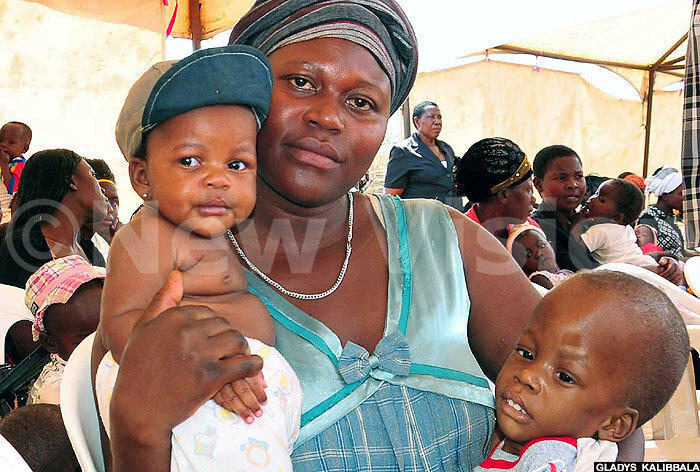
Kamuli learns about ECD
John Mugoya from Kamuli town in Kamuli district returned home and heard his wife talking to someone in the room. Before knocking on the door, he says he first straightened his tie in order to look smart in the eyes of the visitor he hoped was at their home.
But he was shocked to find his wife talking to their unborn baby, promising to love and give him care the moment he or she gets into this world.
"This did not make any sense and my conclusion was that some women get confused when they become pregnant, as I could not imagine a baby inside the womb to listen," admitted Mugoya.
He was one of the few fathers who turned up at a recent ECD sensitization outreach at Kamuli district grounds, where he left a changed man. "I didn't know my children missed my playing with them. From today I will create some time over the weekend to teach them exciting games."
It was an eye-opening experience for Mugoya when experts explained the importance of ECD which also enables children to grow well.
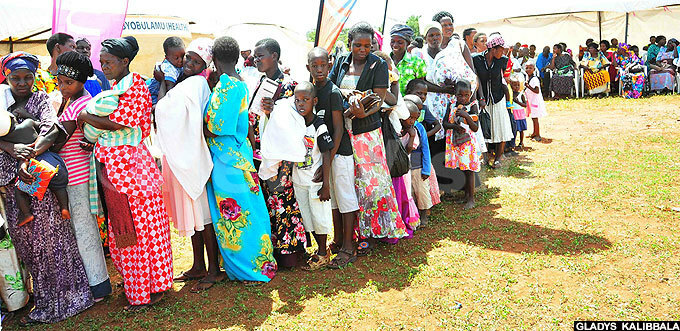
The community were told of how getting a healthy baby starts with giving care to the mother during pregnancy where she will need to eat the right food, have good exercises, sleep under a mosquito net and much more.
Rose Mukoda, a senior midwife at Kamuli General Hospital, expressed concern that when many pregnant women attend antenatal for the first time at the facility, they never return until it's time to deliver.
"Failure to attend all the required antenatal schedules is dangerous to the unborn babies and it is unfortunate that even after delivery, bringing them back for immunization is a big challenge."
While attending to pregnant women who turned up for the sensitization at Kamuli, midwife Mukoda shared another concern. She said when they go out in the field to help immunize children, mothers give very lame excuses.
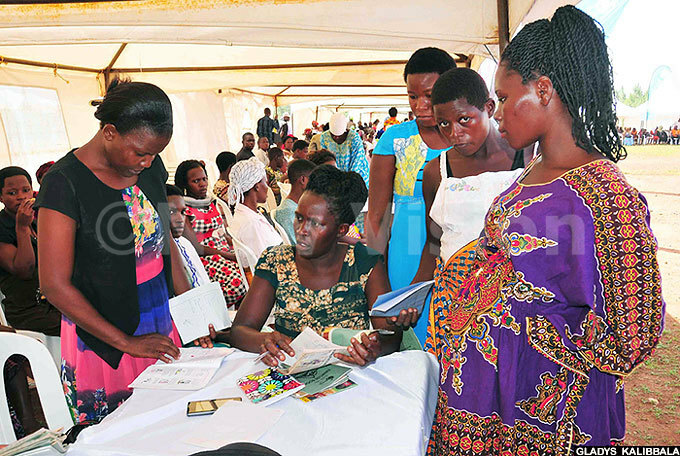
Pregnant women at the antenatal stall in Kamuli during the UNICEF sensitisation event
"If she does not tell you how she forgot the dates she was supposed to report back for the next dose, she will tell you she lost a relative and went for burial where she has spent two months without coming back home."
Reports from UNICEF indicate that although immunization has improved, it's only about 66% of children that have so far received full immunization.
Lindah Nabirye, also a midwife at Kamuli General Hospital, urged pregnant women to lure their husbands into escorting them to hospital for antenatal care. Women were told how they will see changes in the movement of the babies in their womb if their husbands touch them and sing to these unborn beings.
"Just try it when you get home and see how the babies inside there turn and jump with excitement," she told them, drawing applause.
Parents were also told that expressing love is very important to the baby from the very start, through talking to them while inside the womb. According to UNICEF reports, such gestures always stimulate the brain of the unborn baby who is believed to listen to these voices.
Playing with babies in their early life after birth is equally vital. Men learnt that they can not only feed, bathe or clean the baby but also play or sing to them as a sign of love.
The Kamuli residents were taught how crucial it is for mothers to breastfeed their babies as much as possible including giving them toys at the right time. The importance of keeping proper hygiene was also a point of emphasis.
"Washing hands with soap reduces the number of people who contract diarrhea," a nurse told them.
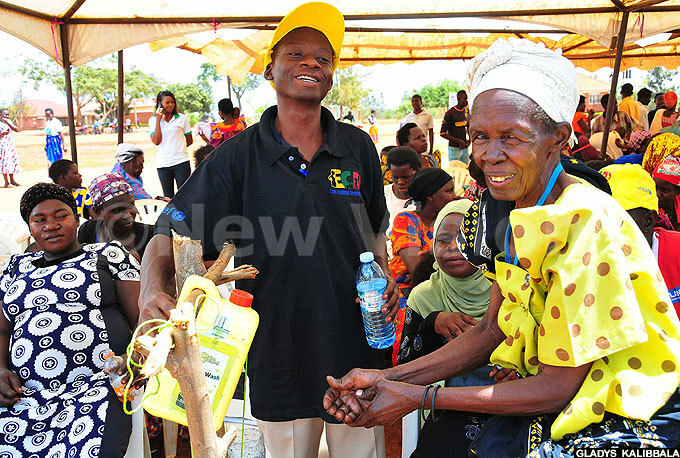
Paul Kitugundu, the community development officer for Namasagali, helping an elderly woman to wash hands during the event
While many parents in urban centres hate finding their children dirty as a result of playing, parents learnt it is very health to allow their children to engage in a variety of games. Children should be allowed to exercise their rights properly, they were advised.
Lessons drawn
Six-year-old Siraje Muwanika and his elderly grandmother were among those that braved the sweltering temperatures to learn more about the growth of children in Uganda plus proper hygiene. Here, many families interviewed complained of high levels of poverty which they explained has led to children being deprived of many of their rights.
According to information from UNICEF, child poverty in Uganda is at 55% for those under five years and 38% for those between six and 17 years of age. Such figures indicate children who experience about two or more deprivations.
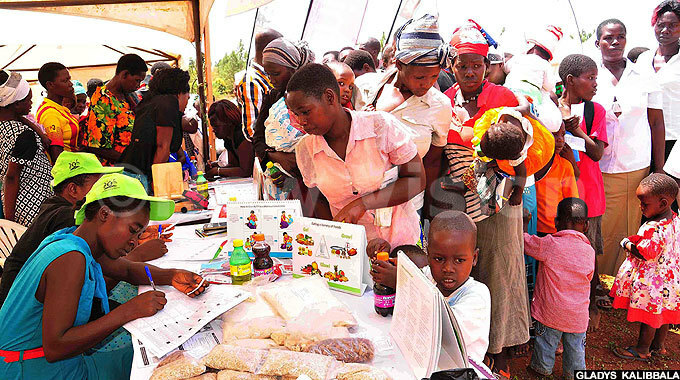
Mothers at the 'Good Feeding' stall to learn about proper feeding of their children
Little Muwanika said they have only one meal a day. Besides food and water, they also struggle with other items like soap and paraffin (for lighting) at his grandmother's in Budhumbuli village, Kamuli district.
This was after UNICEF communication officer Catherine Ntabadde had asked parents to emphasize the washing of hands with soap to their children every after each visit to the toilet to help improve hygiene practices.
"If you want to keep your children healthy teach them toilet manners like stopping to defecate in open places and in water sources as this will contaminate the water they use to prepare food," urged Ntabadde.
Experts explain that water points in many areas are often not functioning or are overcrowded which forces communities to resort to unsafe open water sources as rivers or lakes.
Ntabadde explained that as parents watch their children grow, it's important to make sure that they are provided with their basic rights as children - nutrition, health, water, education, shelter, sanitation, information and protection. She also appealed to parents to create time off their tight schedules and show their children love by playing with them or telling them stories.
Meanwhile, Thomas Badaza, the in charge of ECD at Kamuli, advised parents to provide at least local playing toys to their children as this helps stimulate their brains to learn and explore more. The community received other services like immunization of children, antenatal services and proper information of feeding their children.
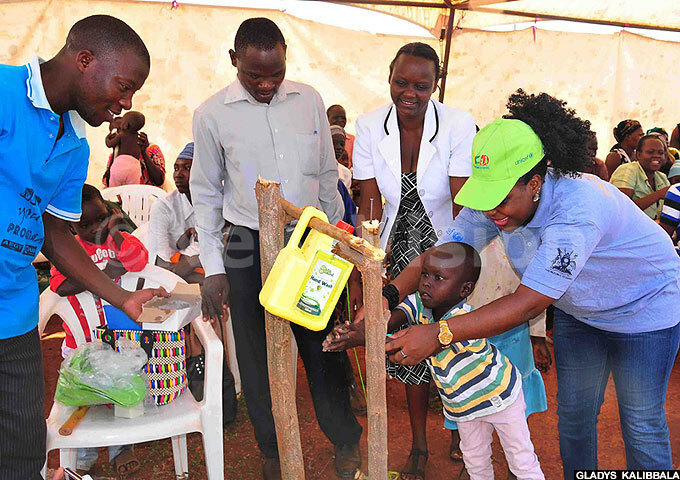
Poverty a big challenge
Muwanika, six, whom we mentioned earlier, has not yet started school because his grandmother has no money to send him and other six siblings to school. Both their parents are believed to have succumbed to HIV/AIDS, leaving the caretaking burden on his grandmother, a widow herself and advanced in age.
At the gathering in Kamuli, it was noted that many women had between six and a dozen children, where majority had started giving birth around the age of between 13 and 16.
A few of these women knew about family planning while those who had an idea explained that their husbands cannot allow them to use these methods. Others claimed such services are not available at their health centres or health facilities which are also very far from their homes.
UNICEF reports indicate that part of Uganda's disease burden can still be avoided if the communities improved on their hygiene by constructing latrines in their homes and washing hands with soap and water each time they visit toilets.
"Children from households without access to improved sanitation facilities are at increased risk of contracting serious illnesses like dysentry, diarrhea and typhoid fever which can be deadly," the report indicates.
Irene Mukyala, a parent, decried the state of latrines in many schools, saying that they are few, dirty and shared by both girls and boys while the latrines don't even have doors.
"This state complicates matters when girls are in their menstruation periods. How do you expect a girl to use a latrine without a door when she is supposed to change her pads?"
She appealed to community leaders to extend their sensitization to village levels.
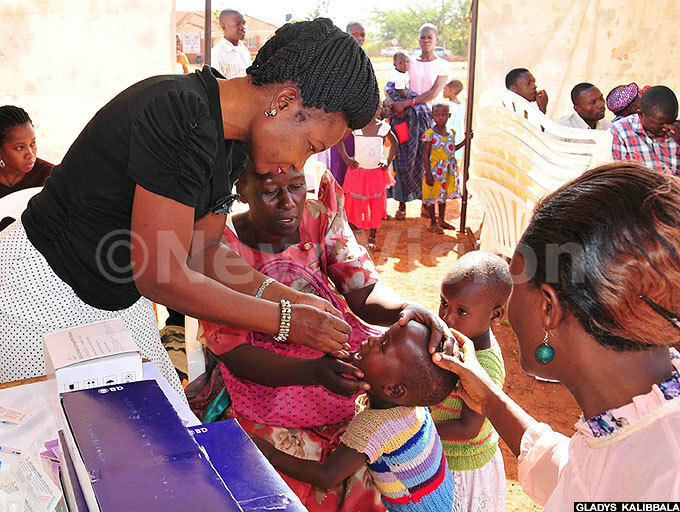
Children were immunised at Kamuli
Ash is a good substitute
For those who cannot access soap, Paul Kitugundu, the community development officer for Namasagali sub-county in Kamuli district, recommended the use of ash. Demonstrations were carried out at the venue and many washed their hands with ash which was readily available.
Kitugundu explained how they have sensitized communities around Busoga to use ash to wash their hands with whenever they run out of soap. "Ash is a disinfectant, easily accessible in many homes and can help in prevention of many infections due to poor hygiene."
He said open defecation is very common in this area where most people have no access to toilet papers. "They use all sorts of things to clean themselves, leaving their fingers dirty while some have cultural beliefs as far as the use of latrines is concerned."
When it comes to communities around the lakeshores, Kitugundu said they still believe in a proverb ‘Enyanja tennoga' (meaning ‘the lake is so large that defecating in one point cannot affect the water').
He noted that although it's expensive to construct latrines around the lakeshores because of the nature of the soil, these communities rarely make an effort to come up with measures to put in place permanent latrines, claiming it is very expensive to do so.